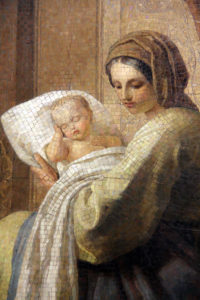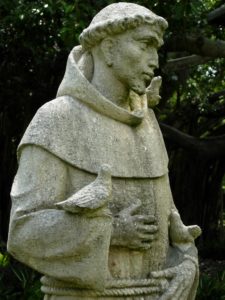Let me share with you the story of how I came to a new understanding of the saints and the role that they play within the faith of many Christians. First of all I am a convert to Christianity. My parents, (very good, kind, loving people) were not religious. The extent of my sister and my religious upbringing was my mother would lead the family in praying a short prayer in Russian (my parent’s first language and a language I have never understood) before we ate our Sunday morning breakfast. It was many years later that I accepted Jesus into my life and became a Protestant. After my conversion, I became what I now call a “Catholic Basher.” Catholicism, being so large, was an easy target for a new, rather self-righteous convert like myself.
I believed the all too common misconception that, while Protestants worship Jesus, Catholics worshipped saints. Imagine my shock and horror when a few years later I met Catholics who mistakenly believed that while they worshipped Jesus, Protestants worshipped something else.
A great American Catholic, Archbishop Fulton Sheen, once said, “There are not one hundred people in the United States who hate the Catholic Church, but there are millions who hate what they wrongly perceive the Catholic Church to be.” Though his statement was in an American context, Archbishop Sheen’s words hold true in many situations and places. All too often one person’s view of another person’s faith is based on false information and mistaken perceptions.
The issue that was most troublesome for me with Catholics was the saints. I came to know Jesus. I could speak to him directly. Why would I need a saint to help me when I could ask Jesus himself? Wasn’t it wrong to worship saints anyway?
I was completely amazed to discover that, in fact, to worship the saints was and is considered heresy in the Catholic Church. The faithful within Catholicism are encouraged to have great reverence and respect for the saints – but God and God alone, in the three persons of the Holy Trinity, are to be the sole object of worship.
So then what about all of this ‘praying to the saints’ stuff? Especially Mary! Why do Catholics spend so much time with Jesus’s mother rather than Jesus himself?
In order for me to understand my Catholic friends, I decided that I would examine the particular ritual prayer that many Catholics pray, called “The Rosary.” A prayer repeated 53 times in the saying of a regular Rosary is known as the “Hail Mary.” The words to the “Hail Mary” are:
Hail Mary, full of Grace; the Lord is with you.
Blessed are you among women.
And blessed is the fruit of your womb, Jesus.
Holy Mary, Mother of God.
Pray for us sinners, now and at the hour of our death.
Amen.
When I first sat down to take a serious look at this prayer I again was amazed. Its first line contains words of respect to an obviously special person, Mary, whom God chose to be his earthly mother. Logically, Mary had to be an exceptional young woman to have been chosen for the task of being God’s Mother on earth. To my amazement, in the “Hail Mary”, nowhere is there a hint of worshipping Mary. Respecting Mary, yes – worshipping Mary, no.
As I pondered this insight, I thought, “Wait, I’ve not only heard but I have read these same words many times before.”
I picked up my King James Bible and read from the Gospel of Luke, Chapter 1, verses 26 to 28:
And in the sixth month the angel Gabriel was sent from God unto a city of Galilee, named Nazareth, to a virgin espoused to a man whose name was Joseph, of the house of David; and the virgin’s name was Mary. And the angel came in unto her, and said, Hail, thou that art highly favored, the Lord is with thee: blessed art thou among women.
My amazement remained. The first part of the “Hail Mary” prayer comes right out of the Bible. It was in fact God’s holy Archangel Gabriel who first said:
Hail Mary, full of Grace, the Lord is With You.
Blessed are you among women.
Then I read on in the “Hail Mary”:
Blessed are you among women.
And blessed is the fruit of your womb, Jesus.
Holy Mary, Mother of God.
Pray for us sinners, now and at the hour of our death.
Amen
I was again drawn to the Gospel of Luke in my King James Bible, Chapter 1, verses 39 to 45, which says:
And Mary arose in those days, and went into the hill country with haste, into a city of Judea; and entered into the house of Zacharias, and saluted Elisabeth. And it came to pass, that, when Elisabeth heard the salutation of Mary, the babe leaped in her womb; and Elisabeth was filled with the Holy Ghost: and she spake out with a loud voice, and said, Blessed art thou among women, and blessed is the fruit of thy womb. And whence is this to me, that the mother of my Lord should come to me? For, lo, as soon as the voice of thy salutation sounded in mine ears, the babe leaped in my womb for joy.
Mary’s cousin Elizabeth repeated the words said by Archangel Gabriel: “Blessed are you among women.”
And then Elizabeth continues by saying: “And blessed is the fruit of your womb.”
To my continued shock and amazement, I discovered the simple truth that the “Hail Mary” is a prayer totally rooted in the Bible.
The final lines of the “Hail Mary” was my next amazement (yes, dear reader, I seem to live in a glorious world of amazement):
Pray for us sinners, now and at the hour of our death.
Amen.
In the prayer Mary isn’t worshipped; she is in fact asked to pray for us. If Mary were the object of worship in this prayer, it would be ridiculous to ask her to pray to herself. Jesus is the object of worship in this prayer. I realized that the Rosary is actually a beautiful, meditative, biblically-based prayer that focuses on 20 events throughout the life of Jesus, his mother, and the early Church community. When we ask Mary to pray for us, it is asking a beloved friend to pray for us.
A short while after I gained new insights into Mary, other saints became part of my life. While doing a mission overseas I started to read The Little Flowers of St. Francis. As I read about the life of St. Francis of Assisi, another insight occurred to me. If God could change the lives of many people through the life of a very fallible Francis, he could do the same through a very fallible me.
I thank God for the example of all of these people throughout history who, in spite of many different personal challenges and trials, through faith grew close to God. In the process of growing close to God, these people helped to change the world they lived in for the better. We Christians call these people “saints”. If you have not been mentored by a saint or two in your own spiritual journey, my advice is to get to know some of them. I guarantee you will be glad you did.
I’m glad that I dared to examine the evidence of what was actually said and what was actually done in this issue of the saints and their role in the lives of Catholic and non-Catholic Christians alike. Friends, let us continue to examine our own faith, and the faith of others, and let us do it dedicated to avoiding all false information and wrong perceptions.
As Christian apologist and author Gregory Koukl wrote, “The great philosopher Socrates once counselled that ‘the unexamined life is not worth living.’ The theological parallel is just as valid: the unexamined faith is not worth believing.”
Throughout May, Ron Semenoff will be giving a series of talks called “The Communion of Saints”, every Friday evening at the Starfish Christian Arts Centre in Calgary, Alberta. Starting at 6 p.m., the evening includes a potluck supper, a “featured saint”, music and fellowship. No charge; freewill offering. Join Ron and friends for an evening of community, enlightenment and inspiration. Call 403-243-1049 for more information.









